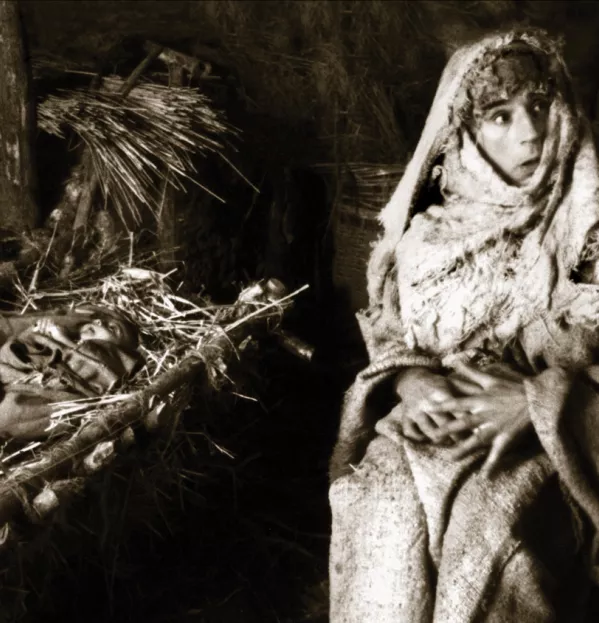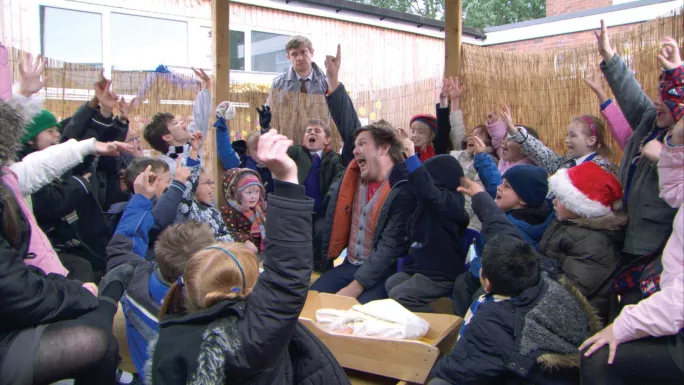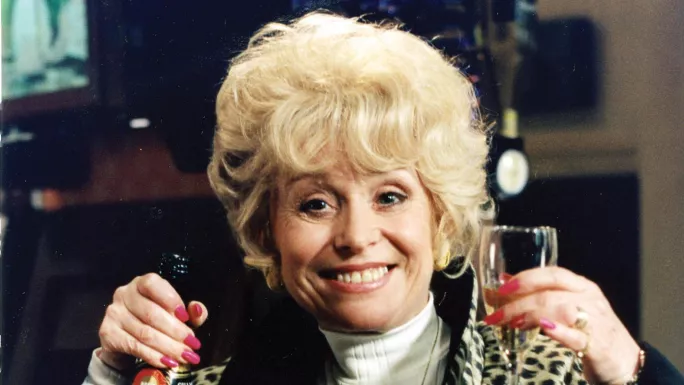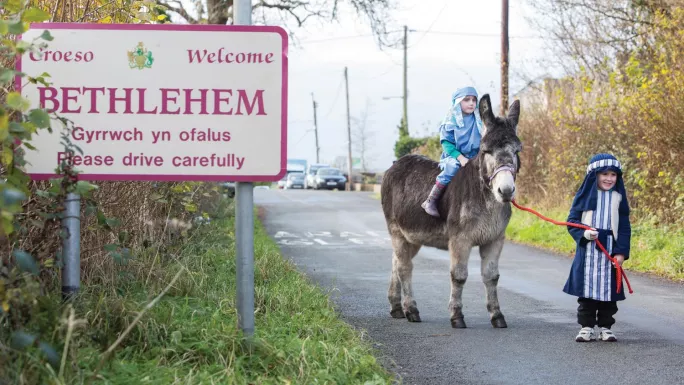How do you solve a problem like Mary?

It is the moment before the audience bursts into rapturous applause. The last strains of Away in a Manger drift into the darkness of a packed school hall and, for a few seconds, you could hear a pin drop... Well, you could if it wasn’t for the rustling crisp packets, the crying babies (not Jesus), and the quiet sobbing of the parents of the Marys. That’s Marys. Plural.
I’m not sure how easy God found the process, but choosing one girl to be the mother of the Saviour of the World certainly presents some problems for the teacher tasked with being executive director of the school nativity play. As soon as the opening bars of Oh Little Town of Bethlehem ring through the corridors, every wannabe star of stage and screen is pestering for the top job. Even worse, every pushy mother of every wannabe star of stage and screen is demanding to know when the casting of Mary will be announced.
In his heart of hearts, the director knows it should be Ellie. She’s the obvious choice. She’s meek, mild and modest. If he were God, he would simply make an executive decision, send a couple of angelic messengers around to inform everybody of his choice and sort the paperwork out at someone else’s convenience.
But God is omnipotent, and has divine assistants to carry out His bidding, and fears not the wrath of Anjelica or Anjelica’s mum. If the most highly favoured Ellie is to get the starring role, the executive director will have to work in mysterious ways to make it happen.

1 Cast the last first and the first last
It sounds counterintuitive, but the most effective way to cast a nativity play is to assign roles in reverse order of importance. In other words, start with the sheep and work your way up. For is it not written that “the last will be first and the first last”?
In the time it takes to say, “Do not be afraid, for I bring good news of great joy: you’ve all got a part in the nativity play”, the minor roles can be assigned and the recipients sent away to write their backstories. The timid flock together to hide behind a sheep mask and make baa-ing noises; the warlike march off to enlist in the Roman army; the virtuous ascend to the ranks of angels; and anyone with a tea towel is a shepherd.
This leaves several girls all desperate to be Mary, and one boy to play Joseph.
2 Supporting roles
The next stage of the casting process involves persuading the wannabe Marys that the part might not be all it’s cracked up to be. To do this, the executive director must play down the importance of the so-called starring role while simultaneously bigging up the main supporting roles.
Below is an illustration of how the casting process might proceed from this point.
“Put your hands down, stop shouting ‘Me, me, me!’ and think carefully, is Mary really the role for brilliant actors like you?”
(A pregnant pause - no pun intended - may be left here for the girls to process this information.)
“I mean, Mary is OK but it isn’t a role that requires great drama skills…No, Anjelica, she does not get to gob off at the innkeeper…Neither does she get to scream and swear while going through labour without an epidural, Janine...To be honest, Nigella, for most of the play she just gets to wear a big blue dress with a cushion stuffed up it…That’s right, Chanel, ladies never look their best just after they’ve given birth…That’s why I think you should first consider some of the other, more important characters.”
By now the wannabe Marys are wavering in their determination to play the part of the Blessed Virgin. While this is happening, the executive director must seize the opportunity to promote the supporting roles by stressing, in a targeted way, how each might be perfect for someone aspiring to be a star of stage and screen.

The Pub Landlady
And then the words of the casting director fell upon Janine’s ear and her face did verily light up like a Christmas tree. “Of course the innkeeper can be a girl, Janine. But she has to be a special girl. One who can look glamorous and wear big dangly earrings and say important lines like, ‘No room at the inn’ and ‘Last orders at the bar’ and ‘Get out of my pub!’ in a loud, clear voice…Why don’t I just pencil you in for now?”
Angel-in-Chief
“Obviously, Nigella, this stand-out role positively screams for someone with a glowing personality and the ability to rise above the rest. Remember that her radiance and power must be able to fill the heavens, causing lesser mortals [boys wearing tea towels] to cower beneath her winged awesomeness.”
Nigella shakes her curls in the manner of one envisioning her ascendancy to greatness.
“And not only that but it’s a speaking part, too, for is she not the Herald who will proclaim the birth of the Messiah?”
Three Queens
Now, the executive director turns to Dolce, Gabbana and Chanel, and, inspired by the words of Mrs Eddison (“Wise Men” is a contradiction in terms), says unto them, “Don’t think of them as three kings but as three queens; rich empresses who have travelled from the exotic east on camels…Actually, Dolce, the camel in biblical times was the equivalent of a stretch limo with tinted windows and a cocktail bar…That’s right, Gabbana, imagine yourself as a VIP, clothed in designer chic, dripping bling and bearing a gift the like of which you can get only from Harrods...It’s like Waitrose, Chanel, only more posh.”
Herod
Here, the executive director takes a deep breath, looks directly at Anjelica, and says: “Now I’m looking for someone to play the real starring role.”
“Do you mean Mary?” asks Anjelica.
“I mean Herod,” the director replies.
“He’s a boy,” snaps Anjelica.
“She’s the ruler of Judea,” says the director. And before Anjelica can protest further, he reveals the ultimate truth.
“The best role in this drama, Anjelica, isn’t some pathetic little meek and mild girl. It is a cold, calculating and bloody tyrant. A powerful queen, ruthless enough to order the deaths of hundreds of small boys. So what about it?”
Anjelica is tempted but not yet convinced. “My mum says I should be Mary,” she argues. “So does mine,” says Janine. “And mine,” says Nigella.
All seems lost until, in a flash of divine inspiration…

3 A Christmas compromise
And so it came to pass that, in one last act of creative desperation, all did become Mary. Janine became Mary Mitchell, landlady of the Queen of Sheba. Nigella became the Archangel Mary Christmas. Dolce, Gabbana and Chanel became Mary Gold, Mary Frankincense and Mary Myrrh. And Anjelica became Herod the Great, known throughout the world as Bloody Mary.
And when all the other Marys had left the classroom, the executive director turned to Ellie, so meek and so mild, and said unto her, “I’ve got just the part for you...”
Steve Eddison teaches at Arbourthorne Community Primary School in Sheffield
You need a Tes subscription to read this article
Subscribe now to read this article and get other subscriber-only content:
- Unlimited access to all Tes magazine content
- Exclusive subscriber-only stories
- Award-winning email newsletters
Already a subscriber? Log in
You need a subscription to read this article
Subscribe now to read this article and get other subscriber-only content, including:
- Unlimited access to all Tes magazine content
- Exclusive subscriber-only stories
- Award-winning email newsletters